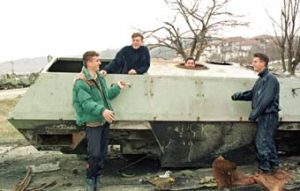Special Reports NATO bombing Yugoslavia Kosobo Abandoned, contaminated tanks “This is our favorite playground.” -Residents Ignorant of Danger
Jul. 7, 2000
No research institution, no countermeasures
After gathering information in Serbia, I left Nis and headed for the province of Kosovo. Making detours to get around broken bridges, struggliing along bad mountain roads, we arrived at the "state border" in a little over 2 hours.
As we said goodbye, my interpreter, Bozinovic, urged me to, "Tell us what's happening in Kosovo." He was clearly sad about this separation from his Albanian neighbors. Then I was in Kosovo, now governed by an international peacekeeping force led by the US, UK, Germany, France, and Italy-the five NATO countries.
Prizren is about 100 kilometers (63 miles) from the border. I chartered a vehicle that happened to come along through the good offices of British soldiers and set off toward my destination via the capital, Pristina. From Prizren to Dakovica, finally arriving in Peya, southwest Kosovo. This area received concentrated attacks with DU munitions.
During the fighting, nearly all of the Albanians fled to neighboring Albania or Macedonia. Many had since returned under the protection of the international security forces. When I asked them about DU munitions, not one of them knew anything about it at all. Even among those working through NGOs from other countries to offer medical and other assistance, I found almost no one who had heard of depleted uranium.
When I interviewed spokespersons at the US and British defense departments, I asked, "Are you taking measures to protect your soldiers stationed in Kosovo?" Both departments answered identically. "We have instructed them not to touch DU munitions or tanks that were destroyed by DU penetrators. We are taking adequate protective measures as required."
However, those warnings have never reached the residents nor the NGO personnel. "Depleted uranium penetrator? What sort of weapon is that? What effect does it have?" After asking the question, in most cases I ended up explaining.
Serbian scientists have been engaged in sophisticated nuclear science at theNuclear Institute of Vinca in the outskirts of Beograd and elsewhere. Thus,they began measuring radiation even during the bombing have responded swiftly. In the Gulf War and Bosnian Conflict, a few Serbian tanks were attacked by DU munitions so they are experienced in studying the effects. However, such a system is non-existent in Kosovo.
200 sheep all killed
Guided by my interpreter Haji Hoti (37), an Albanian who works with an NGO based in Prizren, I explored Dakovica and vicinity by car.
Visiting farmhouses outside of town, we encountered Asdren Spahia (27), a farmer.
"I've got no energy," he complained in Albanian. When the bombing started, I sent the rest of my family out and stayed here with my father (75) to take care of my 200 sheep. We were spared the atrocities of the Serbian soldiers and direct bombing by NATO, but all our sheep died. I have no doubt that they died because of the bullets that fell all around here." Spahia and his father are still unable to buy a single sheep.
Very close to downtown Dakovica lie the remains of a Yugoslavian military base. Residents' houses line the road across from the base where tanks and trucks destroyed by DU penetrators lie abandoned where they were hit. We found young men playing on one.
"We always hang around here. If we find something dangerous like a cartridge case we're supposed to let the foreign soldiers know. We've told them about some things and a lot of stuff was cleaned up. We touched it though." One of the boys, Edmond Demaj (16), remarked casually.
"This tank is contaminated by radiation. It's dangerous for you to get up there." When Hoti told them this they said, "Why? This is the most interesting place to be." They climbed down from the tank but seemed unconvinced.
Not one public report
According to Hoti, there has never been a single report about DU munitions even in local newspapers or on the radio.
I wanted to meet the man responsible for the Italian troops who are charged with keeping peace in and around Dakovica. I visited the Italian headquarters. The guards at the entrance refused even to hear what I wanted. They simply refused to open the doors. I went to the headquarters of UNMIK (UN Interim Administration Mission in Kosovo), which is charged with governing Kosovo,and again, they only said, "That's not our job." It seemed no one was sure where the responsibility resided.
"We're glad the NATO bombing chased the Serbs out, but if they left a bunch of radiation around... We need to get these international institutions or NGOs to do a thorough scientific investigation or we'll never be able to live here with confidence,"
Hoti declared. His face mirrored those of the Serbian scientists worried about radioactive contamination in Kosovo.
(Originally published on July 7, 2000)








